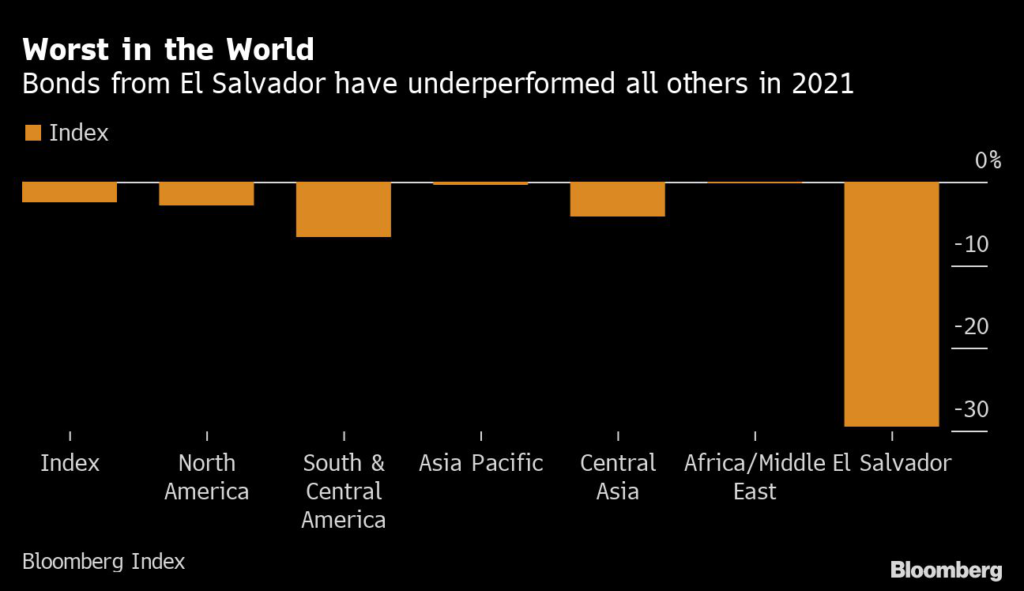(Bloomberg) —
El Salvador President Nayib Bukele made himself a hero to the Bitcoin faithful this year with a whole hearted embrace of the crypto currency. Bond investors have an entirely different view on the country’s leader.
The nation’s overseas notes posted the world’s worst performance this year with losses approaching 30%, according to data compiled by Bloomberg. Its $800 million of bonds coming due in early 2023 are now priced below 80 cents on the dollar, signaling skepticism that holders will get paid back on time.
The bond-market rout shows that for all the excitement Bukele generated in certain circles by adopting Bitcoin as an official currency and using government money to buy the coins, traditional financiers are dubious. They’re especially wary of his intention to sell $1 billion in tokenized dollar-denominated debt early next year, and worried the International Monetary Fund will be unwilling to provide financial support given the unconventional economic plans and growing tensions with the U.S. over his moves to cement control of the government.
“Having an unpredictable man who controls everything doesn’t inspire much confidence in anyone,” said Carlos de Sousa, an investor at Vontobel Asset Management in Zurich. “He went beyond promoting Bitcoin. You have a president trading Bitcoin on his phone with the government’s money, and that’s unprecedented.”
For all the noise around the cryptocurrency, bondholders’ concerns are more conventional: They see a developing-nation that’s running up a big budget deficit and may get to the point it can’t or doesn’t want to repay its debt. Gross indebtedness grew to 89% of gross domestic product in 2020 and is on a path to hit 98.6% in the next five years, according to the IMF.
Further complicating the outlook for investors, Bukele has said he plans to issue $1 billion in 10-year bonds next year on Blockstream’s Liquid Network to yield 6.5%. Half of the proceeds would be used to buy Bitcoin. Some bondholders on Wall Street fear a successful issuance could cause the government to move even further away from traditional financial markets and the IMF.
“There’s a good shot that he’s able to get this done, and this is just going to embolden him even further,” said Jared Lou, a money manager at William Blair Investment Management in New York, who first warned about investing in Salvadoran debt in August 2020. “The path of getting paid back really relies on this model, and this model relies on Bitcoin prices.”
The IMF warned of “significant risks” for El Salvador from embracing Bitcoin, and the U.S. has criticized the Bukele administration for a lack of transparency, sanctioning several officials in December amid corruption allegations. Bukele fired back saying “the U.S. doesn’t want collaboration, friendship or alliance. They want absolute subjugation or nothing.”
The U.S. has the largest share of voting power on the IMF’s board of directors, which has to approve the lender’s programs before disbursement of funds. Finance Minister Alejandro Zelaya announced plans in March for a $1.3 billion extended fund facility with the IMF. So far, no program has come to fruition.
“An escalating diplomatic conflict will make it even more difficult for Bukele to secure an IMF program” Eurasia group analyst Risa Grais-Targow wrote in a note Dec. 13, adding U.S.-El Salvador relations have “deteriorated sharply.”
Some analysts are seeing ways that El Salvador could make good on its debt payments, even if the bets on Bitcoin go awry. Alejandro Arreaza and Nestor Rodriguez, strategists at Barclays Plc, wrote in a note last month that Bukele could come up with the necessary money by nationalizing pension funds. Persuading congress to allow him to issue more debt domestically is another option.
Bondholders’ pessimism surrounding El Salvador marks a harsh turnaround from as recently as April, when some of its securities were trading as high as 116 cents on the dollar amid optimism an IMF program would shore up the country’s finances. Prices for those notes, due in 2052, have since crashed to 62 cents.
Amid the collapse in bond prices, Bukele remains enormously popular at home. His approval rating was 85% in December, according to a poll by independent media outlet LPG Datos. That level of support may make it easier for Bukele to pursue ill-advised spending plans or embark on other unconventional financial maneuvers.
“El Salvador has been a very difficult bond curve to trade, but this is arguably the worst it’s ever been,” said William Blair’s Lou. “The governance issues are going to lead to acute financial distress.”
More stories like this are available on bloomberg.com
©2021 Bloomberg L.P.











